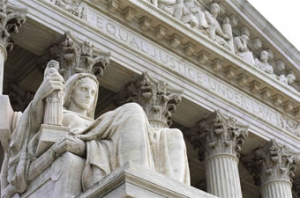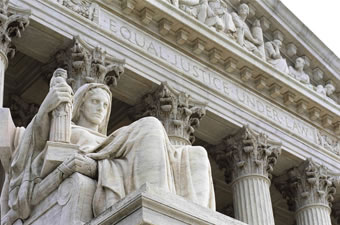 For three days next week, the U.S. Supreme Court will hear oral arguments in a case that will determine the fate of the health care reform law signed by President Obama two years ago.
For three days next week, the U.S. Supreme Court will hear oral arguments in a case that will determine the fate of the health care reform law signed by President Obama two years ago.
The Patient Protection and Affordable Care Act introduced a number of changes to how the health insurance industry operates and would cover more than 30 million uninsured Americans. Immediate changes include allowing adult children to remain on their parents’ insurance until they turn 27 as well as the elimination of yearly and lifetime coverage caps. More changes will be rolled out slowly until 2014, when the full law takes effect.
But opponents argue one provision in particular is unconstitutional — the so-called individual mandate that takes effect in 2014 and requires most Americans to purchase health insurance or else face heavy fines. They say, by mandating that consumers enter the marketplace and purchase insurance, the law violates the Commerce Clause of the Constitution that regulates interstate economic activity. The federal government can’t force you to buy something, even health insurance, they say.
The Supreme Court agreed to hear oral arguments in a lawsuit filed in Florida by 26 states and a ruling is expected by June. If the high court finds the individual mandate unconstitutional, experts say it is unclear whether the entire law could be struck down as a consequence or if the individual mandate could be severed from the law, leaving the rest intact.
Studies by the Pew Research Center (found here and here) show that young adults under 30, those hit hardest by the economic downturn and underemployment—a group Pew calls “Millenials”—may stand to gain the most if the law is upheld. But, they found, Millenials are also apathetic about reform, more so than other age groups.
Pew’s research says 33 percent of young adults under 30 do not have health insurance, a number that could jump if the law is struck down, causing many 20-somethings to be dropped from their parents’ insurance. However in 2010, just before passage of the health care reform bill, less than half of Millenials, 47 percent, had a favorable view of the changes proposed by Congress. And yet, Millenials also reported having little knowledge of the bill. Only 22 percent had heard “a lot” about the legislation.
Support may have been weak because Millenials, according to Pew, did not believe health care reform would benefit them. Few young adults said they thought health care would improve because of the legislation.
With the Supreme Court set to take up the law, JJIE wanted to know where the Millenials, a generation struggling to find their way and achieve financial independence, stood today. Are they hopeful the law would be upheld? Or do they believe the law isn’t helping them? But mostly, do they even care at all?
In fact, passionate young voices may be heard from both sides of the issue, but weighing heavily on them all is the ailing economy and the dismal job market for young adults and recent college graduates.
The College Republican National Committee (CRNC) says the U.S. simply cannot afford the health care reform bill.
"Not only does it add another trillion [dollar] entitlement to a cash strapped nation but it takes money directly out of the wallets of young adults," the CRNC writes on its website.
Additionally, the website says, because health care for Americans aged 60-64 costs four to five times more than care for young adults, a mandate meant to keep insurance premiums affordable for older Americans will shift the cost to younger Americans.
"In other words, young adults are being forced to overpay for insurance," the CRNC website says.
In response to a question by a local television journalist posted on Twitter, one state chapter of the College Republicans called for repeal.
"Obamacare [the Affordable Care Act] threatens our generations [sic] very chance at a prosperous future. Must be repealed," the Arkansas College Republicans posted to Twitter Thursday.
Non-partisan advocacy group Young Invincibles argues health care reform, because of the individual mandate requiring all Americans to purchase health insurance, will actually keep premiums low for everyone as by spreading the risk over the entire population.
But at the same time, the group says, health care reform will make health insurance affordable for young adults.
The law "will provide coverage to millions of uninsured and underinsured young adults," the group says, by giving tax credits to those who earn less than $43,000 a year, a category it says includes more than 75 percent of Americans aged 19-29. Additionally, Young Invincibles says, an expansion to Medicaid will allow young adults earning less than $14,000 per year to qualify, insuring a further 8 million young adults.
It is also, "a matter of personal responsibility," the group says.
"Those who don't purchase insurance end up visiting emergency rooms without the ability to afford care, pushing the cost of their treatment on everyone else," the organization writes on its website.
The Affordable Care Act offers another avenue to coverage for young adults by allowing parents to keep their children on their insurance until they turn 26, Young Invincibles says, a move that could cover an additional 1.2 million young adults. Many more, they say, will be allowed to supplement inadequate coverage with their parents' insurance.
Today, the Internet and social media are the first places many young adults go to take part in political debates and the controversy around health care reform is no different. Here's a sampling of the conversations on Twitter, where young adults are writing about health care reform, the upcoming Supreme Court case and the Massachusetts health care law that is very similar to the federal Affordable Care Act.
"@GOPconference: #healthreform isn't working if more people are#uninsured but in reality we need it more"
Jessica Jacobs @jess_jacobs:
"Real March Madness -- the epic #SCOTUS Battle: Federalism VS#HealthReform"
"Ok THIS is perfect! Ind. mandate works! RT @HCAN: WaPo: Study finds Romneycare making Mass. healthier"
"Wow. Must read. @BarackObama's Affordable Care Act is saving ppl's lives: http://www.barackobama.com/news/entry/letter-of-the-weekmarch-12th-2012 #healthreform #Obama2012"
Not all young people are discussing the issue in 140 characters, however. YouTube user stateofdaniel put together this video in November calling for Justice Elena Kagen to recuse herself from the case. Kagen was an attorney in the Obama White House during the negotiations that lead to the passage of the bill.
